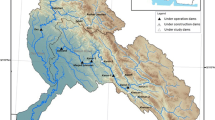Abstract
The optimisation of water pumping plant activation schedules is a significant issue when managing emergency and costly water transfer under a drought risk. This problem needs specific optimisation tools to deal with complex multi-reservoir supply systems and to consider different alternative scenarios. The effectiveness of emergency transfers alleviating droughts requires early warning and activation; on the other hand, the high operating costs of pump stations require system managers to take a robust approach that defines activation rules. The proposed optimisation procedure combines scenario optimisation analysis with a cost-risk balancing approach. The model searches for the identification of optimal decision rules by balancing the risk of water shortages and the operating costs of pumping stations. Scenario optimisation provides ‘barycentric’ values that define the activation threshold by comparing hydrological synthetic series results. A multi-objective approach is also required in order to balance energy cost minimisation requirements and a reduction of damage needs that can be caused by water shortages. Consequently, a scenario optimisation has been developed considering the multi-objective and cost-risk balancing problem. A model application has been developed optimising water management and energy costs in a real water system with shortage risks in the South Sardinia (Italy) region.




Similar content being viewed by others
References
Dembo R (1991) Scenario optimization. Ann Oper Res 30:63–80
Bower BT, Hufschmidt MM, Reedy WW (1962) Operating procedures: their role in the design and implementation of water resource system by simulation analysis. In: Maass A, Hufschmidt MM, Dorfman R, Thomas HA, Marglin SA, Fair GM (eds) Design of water resources systems. Harvard University Press, Cambridge, pp 443–456
Cunha MC, Sousa JJO (2010) Robust design of water distribution networks for a proactive risk management. J Water Resour Plan Manag 136(2):227–236
Dembo R (1995) A robust approach for water resources planning under uncertainty. Ann Oper Res 95:313–339
Gaivoronski A, Sechi GM, Zuddas P (2012a) Cost/risk balanced management of scarce resources using stochastic programming. Eur J Oper Res 216:214–224
Gaivoronski A, Sechi GM, Zuddas P (2012b) Balancing cost-risk in management optimization of water resource systems under uncertainty. Phys Chem Earth 42–44:98–107
GAMS (2008) A User’s guide. GAMS Development Corporation, Washington, DC
Kang D, Lansey K (2014) Multiperiod planning of water supply infrastructure based on scenario analysis. J Water Resour Plan Manag. Vol. 140, No. 1, January 1, 2014. © ASCE, ISSN 0733-9496/2014/1-40-54
Loucks DP, Sigvaldason OT (1982) Multiple-reservoir operation in North America. The operation of multiple reservoir systems, Z. Kaczmarck and J. Kindler, eds., IIASA Collab. Proc. Ser., CP-82- 53, 1–103
Loucks DP, Van Beek E (2005) Water resources systems planning and management. United Nations Educational, Scientific and Cultural Organization (UNESCO), Paris, France
Lund JR, Guzman J (1996) Developing seasonal and long-term reservoir system operation plans using HEC-PRM. Tech. Rep. No. RD-40, Hydrologic Engineering Center, U.S. Army Corps of Engineers, Davis, Calif
Lund JR, Guzman J (1999) Derived operating rules for reservoirs in series or in parallel. Journal of Water Resources Planning and Management. ASCE. May/June.143–153
Maass A, Hufschmidt MM, Dorfman R, Thomas HA Jr, Marglin SA, Fair GM (1962) Design of water resources systems. Harvard University Press, Cambridge, Mass
Napolitano J, Sechi GM, Zuddas P (2014) Scenario analysis for optimization of pumping schedules in complex water supply systems considering a cost-risk balancing problem. WDSA 2014 Conf Bari Proc Eng 89:565–572
Pallottino S, Sechi GM, Zuddas P (2004) A DSS for water resources management under uncertainty by scenario analysis. Environ Model Softw 20:1031–1042
RAS (2006) Piano stralcio di bacino regionale per l’Utilizzo delle risorse idriche. Regione Autonoma della Sardegna, Italy
Rockafellar RT, Wets RJB (1991) Scenarios and policy aggregation in optimization under uncertainty. Math Oper Res 16:119–147
Sechi GM, Zuddas P (2008) Multiperiod hypergraph models for water systems optimization. Water Res Manag 22:307–320. doi:10.1007/s11269-007-9163-2
Sulis A, Sechi GM (2013) Comparison of generic simulation models for water resource systems. Environ Model Softw 40:214–225. doi:10.1016/j.envsoft.2012.09.012
Yuan L, Zhou J, Li C, Xie M, Mo L (2016) Benefit and risk balance optimization for stochastic hydropower scheduling. Water Resour Manag 30:3347–3361
Author information
Authors and Affiliations
Corresponding author
Rights and permissions
About this article
Cite this article
Napolitano, J., Sechi, G.M. & Zuddas, P. Scenario Optimisation of Pumping Schedules in a Complex Water Supply System Considering a Cost–Risk Balancing Approach. Water Resour Manage 30, 5231–5246 (2016). https://doi.org/10.1007/s11269-016-1482-8
Received:
Accepted:
Published:
Issue Date:
DOI: https://doi.org/10.1007/s11269-016-1482-8




